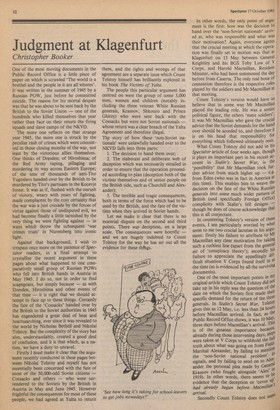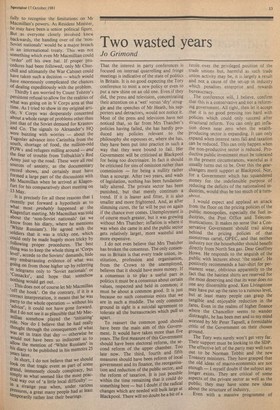Judgment at Klagenfurt
Christopher Booker
One of the most moving documents in the Public Record Office is a little piece of paper on which is scrawled 'The world is a brothel and the people in it are all whores'. It was written in the summer of 1945 by a Russian POW, just before he committed suicide. The reason for his mortal despair was that he was about to be sent back by the British to the Soviet Union — one of the hundreds who killed themselves that year rather than face on their return the firing squads and slave camps of the NKVD.
The more one reflects on that strange year 1945, the more one is struck by the peculiar rash of crimes which were committed in those closing months of the war, not least by the victorious allies themselves. One thinks of Dresden; of Hiroshima; of the Red Army raping, pillaging and murdering its way across Eastern Europe; of the tens of thousands of anti-Tito Yugoslays handed over by the British to be murdered by Tito's partisans in the Kocevje forest. It was as if, flushed with the onrush of victory, weary with years of fighting, made complacent by the cosy certainty that the war was a just crusade by the forces of virtue against those of undisputed evil, we had become finally a little tarnished by the very thing we were fighting against — in ways which throw the subsequent 'war crimes trials' in Nuremberg into ironic light.
Against that background, I wish to trespass once more on the patience of Spectator readers, in a final attempt to crystallise the recent argument in these pages about what happened to one comparatively small group of Russian POWs who fell into British hands in Austria in May 1945. I do so, not in order to find scapegoats, but simply because — as with Dresden, Hiroshima and other events of that time — it is right that we should attempt to face up to these things. Certainly the fate of the 'Cossacks' handed over by the British to the Soviet authorities in 1945 has engendered a great deal of heat and heartsearching, ever since it was revealed to the world by Nicholas Bethell and Nikolai Tolstoy. But the complexity of the story has also, understandably, created a good deal of confusion, and it is that which, as a nation, we have a duty to unravel.
Firstly I must make it clear that the argument recently conducted in these pages between Nikolai Tolstoy and myself has not essentially been concerned with the fate of most of the 50,000-odd Soviet citizens — Cossacks and others — who were surrendered to the Soviets by the British in Austria in May and June 1945. However frightful the consequences for most of these people, we had agreed at Yalta to return them, and the rights and wrongs of that agreement are a separate issue which Count Tolstoy himself has brilliantly explored in his book The Victims of Yalta.
The people this particular argument has centred on were the group of some 3,000 men, women and children (notably including the three veteran White Russian generals, Krasnov, Shkouro and Prince Ghirey) who were sent back with the Cossacks but were not Soviet nationals — whose return was a clear breach of the Yalta Agreement and therefore illegal.
The story of how these 'non-Soviet nationals' were unlawfully handed over to the NKVD falls into three parts: 1. The decision to hand them over; 2. The elaborate and deliberate web of deception which was necessarily entailed in order to ensure that the operation proceeded according to plan (deception both of the victims themselves and of senior people on the British side, such as Churchill and Alexander); 3. The terrible and tragic consequences, both in terms of the force which had to be used by the British, and the fate of the victims when they arrived in Soviet hands.
Let me make it clear that there is no essential dispute on the second and third points. There was deception, on a large scale. The consequences were horrific — and we are hugely indebted to Count Tolstoy for the way he has set out all the evidence for these thfrigs. In other words, the only point of argu ment is the first: how was the decision to hand over the 'non-Soviet nationals' arriv ed at, who was responsible and what was their motivation? Again, everyone agrees that the crucial meeting at which the operation was finally set in motion was that at Klagenfurt on 13 May between General Keightley and his BGS Toby Low of V Corps, and Harold Macmillan, Resident Minister, who had been summoned the day before from Caserta. The only real bone of contention therefore is the respective roles played by the soldiers and Mr Macmillan at that meeting.
Count Tolstoy's version would have us believe that in some way Mr Macmillan played the leading role. He was a senior political figure, the others 'mere soldiers'. It was Mr Macmillan who gave the crucial advice that the Soviet demands for the hand over should be acceded to, and therefore it is on his head that responsibility for everything which followed ultimately rests. What Count Tolstoy did not add in his Spectator article of four weeks ago, though it plays an important part in his recent account in Stalin's Secret War, is the 'possibility' that Mr Macmillan took further advice from much higher up — e.g. from Eden (who was in fact in America at this time). This enables him to weave the decision on the fate of the White Russian generals into some much wider pattern of British (and specifically Foreign Office) complicity with Stalin's fell designs — though he does of course acknowledge that this is all conjecture.
In countering Tolstoy's version of these events, I am particularly worried by what seem to me two crucial lacunae in his argument: firstly his failure to attribute to Mr Macmillan any clear motivation for taking such a ruthless line (apart from the gener& . air of 'conspiracy theory'); secondly lits failure to appreciate the appallingly dit." ficult situation V Corps found itself in at the time (as is evidenced by all the surviving documents).
One of the most important points in nlY original article which Count Tolstoy did not take up in his reply was the question of the date on which the Soviets first made their specific demand for the return of the three generals. In Stalin's Secret War, TolstoY gives this as 12 May, i.e. less than 24 hours before Macmillan arrived. In fact, as the Public Record Office shows, it was 10 MaY,' three days before Macmillan's arrival. This is of the greatest importance because, already during those intervening days, stePs, were taken at V Corps to withhold the full truth about what was going on from Field Marshal Alexander, by failing to mention the 'non-Soviet national problem' signals, and by failing to send on to Alexai ander the personal plea made by Gene. Krasnov (who fought alongside 'Alex' 111 1919). In other words, there seems to be, evidence that the deception or 'cover LIP, had already begun before Macmillan s arrival. Secondly Count Tolstoy does not scent fully to recognise the limitations on Mr Macmillan's powers. As Resident Minister, he may have been a senior political figure. But as everyone closely involved knew backwards, the handing over of the 'nonSoviet nationals' would be a major breach in an international treaty. This was not something which even Mr Macmillian could 'order' off his own bat. If proper procedures had been followed, only Mr Chur chill and ultimately the War Cabinet could have taken such a decision — which would have enormously complicated the chances of dealing expeditiously with the problem. Thirdly I am worried by Count Tolstoy's persistent refusal to allow for the realities of What was going on in V Corps area at that tune. As I tried to show in my original arti cle, V Corps was desperately concerned about a whole range of problems other than Just that of the Soviet demand for Krasnov and Co. The signals to Alexander's HQ were buzzing with worries — about the Yugoslav advance into Carinthia from the south, shortage of food, the million-odd POW s and refugees milling around — and the fear of trouble from Tolbukhin's Red Army just up the road. These were all real sources of anxiety, as the documentary record shows, and certainly must have formed a large part of the discussions with Mr Macmillan when he arrived at Klagenfurt for his comparatively short meeting on 13 May.
It is precisely for all these reasons that I recently put forward a hypothesis as to What most probably happened at the Klagenfurt meeting. Mr Macmillan was told about the 'non-Soviet nationals' (as we know from his diary, where he mentions White Russians'). He agreed with the soldiers that it was a tricky one, which could only be made hugely more tricky by following proper procedures. The best thing was to keep the whole thing at 'Corps lever, accede to the Soviets' demands, hide any embarrassing evidence of what was going on from those higher up by referring 1,11 telegrams only to 'Soviet nationals' or Cossacks', and hope that somehow nothing would get out. This does not of course let Mr Macmillan off the hook'. On the contrary, if 11 is a correct interpretation, it means that he was Party to the whole operation — without his advice', it could not have gone forward. Ilitt I do not see it as plausible that Mr Mac-, Milian somehow played the 'initiating role. Nor do I believe that he had really thought through the consequences of what Was set in train that day — otherwise he Would not have been so indiscreet as to his the mention of 'White Russians' in nis diary to be published in his memoirs 25 Years later.
, In short, I do not believe that we should look on that tragic event as part of some grand, immensely cloudy conspiracy, but s!luply as what seemed like the most practical way out of `a little local difficulty. In a strange year when, under various Pressures, a great many people had at least teruPorarily rather lost their bearings.







































 Previous page
Previous page